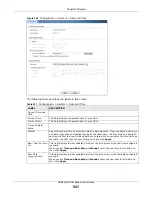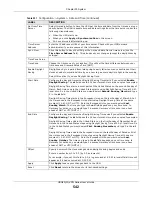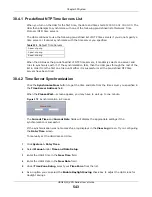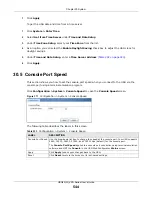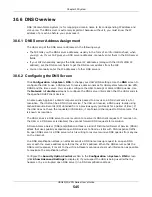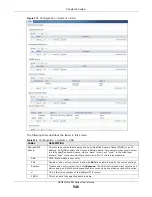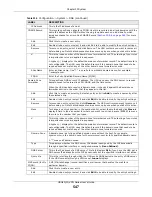
Chapter 30 System
USG20(W)-VPN Series User’s Guide
555
3
The IP address (address object) in the
Service Control
table is not in the allowed zone or the
action is set to
Deny
.
4
There is a security policy rule that blocks it.
30.7.2 System Timeout
There is a lease timeout for administrators. The USG automatically logs you out if the management
session remains idle for longer than this timeout period. The management session does not time
out when a statistics screen is polling.
Each user is also forced to log in the USG for authentication again when the reauthentication time
expires.
You can change the timeout settings in the
User/Group
screens.
30.7.3 HTTPS
You can set the USG to use HTTP or HTTPS (HTTPS adds security) for Web Configurator sessions.
Specify which zones allow Web Configurator access and from which IP address the access can
come.
HTTPS (HyperText Transfer Protocol over Secure Socket Layer, or HTTP over SSL) is a web protocol
that encrypts and decrypts web pages. Secure Socket Layer (SSL) is an application-level protocol
that enables secure transactions of data by ensuring confidentiality (an unauthorized party cannot
read the transferred data), authentication (one party can identify the other party) and data
integrity (you know if data has been changed).
It relies upon certificates, public keys, and private keys.
HTTPS on the USG is used so that you can securely access the USG using the Web Configurator. The
SSL protocol specifies that the HTTPS server (the USG) must always authenticate itself to the
HTTPS client (the computer which requests the HTTPS connection with the USG), whereas the
HTTPS client only should authenticate itself when the HTTPS server requires it to do so (select
Authenticate Client Certificates
in the
WWW
screen).
Authenticate Client Certificates
is
optional and if selected means the HTTPS client must send the USG a certificate. You must apply for
a certificate for the browser from a CA that is a trusted CA on the USG.
Please refer to the following figure.
1
HTTPS connection requests from an SSL-aware web browser go to port 443 (by default) on the
USG’s web server.
2
HTTP connection requests from a web browser go to port 80 (by default) on the USG’s web server.
Summary of Contents for ZyWall USG20-VPN
Page 17: ...17 PART I User s Guide ...
Page 18: ...18 ...
Page 99: ...99 PART II Technical Reference ...
Page 100: ...100 ...

